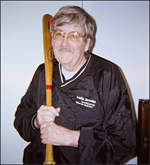August 10, 2009 - By Ruthann Richter

Tony Huesman
Tony Huesman, who survived with a single transplanted heart longer than any other transplant patient, died Aug. 9 at his home in Washington Township, Ohio. Huesman received his heart in August 1978 at Stanford Hospital & Clinics, one of the early beneficiaries of the hospital’s heart transplant program.
He died of complications from cancer, said his wife, Carol Huesman. He was 51. “His heart held up to the end,” she said.
A native of Dayton, Ohio, Huesman was diagnosed while in high school with cardiomyopathy, a disease that progressively weakens the heart. He attended Miami University in Ohio, but dropped out because of his illness. He heard about the new heart transplant program at Stanford, but his doctor discouraged him from pursuing it. “At that time, heart transplants were so off the wall,” Huesman said in a 2008 interview. “Nobody did that.”
In fact, Stanford transplant pioneer Norman Shumway, MD, was the only surgeon then with an active program, which was begun in 1968 following nine years of painstaking work in dogs. Huesman flew to Stanford and was soon put on the top of the transplant list. He was patient no. 153 in the program.
“It was a whirlwind. It all happened so fast,” Huesman recalled in the interview. “They sent a Catholic priest in to give me last rites. I said, ‘No, no, I’m not going to die. I’m going to make it through this.’”
Following the procedure, Huesman spent three months in the hospital’s isolation unit and was so bored at times that he would take to mopping the room himself, he said.
Once recovered, he returned to Dayton and began working in a sporting-goods store where he spent the rest of his career. He began a nonprofit, the Huesman Heart Foundation, to educate children about heart health, producing three children’s books on heart disease and organ donation and making frequent presentations in schools. The organization became his passion.
“Of all the patients we’ve had, I think he gave back the most to society, the community,” said Sharon Hunt, MD, a professor of cardiovascular medicine who knew Huesman. “He managed in a very gracious way to raise a lot of money for good causes.”
After his transplant, he was uncertain about marriage because he did not know what kind of future he might have, he said.
“When I got back from Stanford, honestly they said, ‘You might live five years, who knows?’ because five years was the most anyone had lived back then,” he said in the 2008 interview. “So I never made long-term plans.”
But as the years passed, he met Carol, an elementary school teacher in special education, whom he married in 1997. She said he was a man who was generous in many ways. “He got one heart, and he gave his heart out tenfold,” Carol Huesman said. “We’re going to miss that.”
Huesman received several awards, including the Heart of Dayton award from the American Heart Association and the Miami University Presidential Medal.
“Obviously I’m very blessed to have this second chance,” Huesman said in 2008. “I have to believe I’ve seized the moment, so to speak, and I took this gift and tried to make a difference. Our foundation has been very successful. We’ve given away more than 100,000 books for free. I’ve been very lucky.”
In addition to his wife, he is survived by his father, Robert Huesman, of Centerville, Ohio. His sister, Linda Lamb, also received a transplant at Stanford, five years after him, in 1983. She died in 1991.
Funeral services will be held Aug. 13 in Dayton. The family suggests donations to the Huesman Heart Foundation, 1552 Roamont Drive, Dayton, OH, 45459.
About Stanford Medicine
Stanford Medicine is an integrated academic health system comprising the Stanford School of Medicine and adult and pediatric health care delivery systems. Together, they harness the full potential of biomedicine through collaborative research, education and clinical care for patients. For more information, please visit med.stanford.edu.